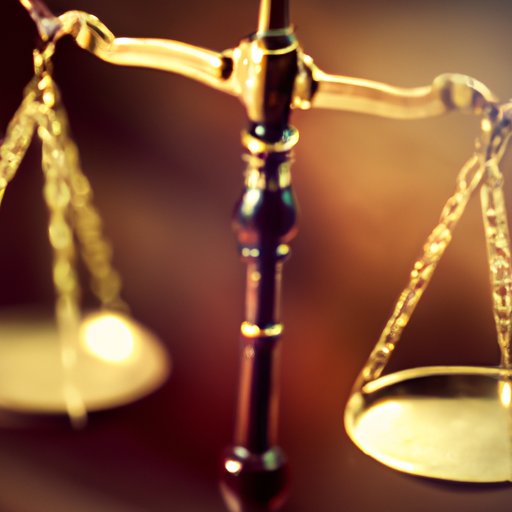
Introduction
Equal treatment under the law means that every person should have the same rights and opportunities under the legal system. This principle is the cornerstone of a fair and just society, yet discrimination continues to hold back many individuals and groups. In this article, we will explore the various legal rights that promote equal treatment under the law and why they are crucial for a free and equal society.
Exploring the Concept of Equal Treatment Under the Law and the Rights That Ensure It
Equal treatment under the law means that everyone is entitled to the same legal protections, regardless of their race, gender, religion, national origin, or any other characteristic. This principle ensures that no one has an unfair advantage or is at a disadvantage before the law. In order to make sure this principle is upheld, there are several types of legal rights that individuals and groups can rely on. These include constitutional rights, human rights, and civil rights.

Constitutional Rights That Promote Equal Treatment Under the Law
There are several constitutional rights that promote equal treatment under the law. The Equal Protection Clause, found in the Fourteenth Amendment, prohibits states from denying any person within their jurisdiction the equal protection of the laws. The Due Process Clause, also found in the Fourteenth Amendment, protects individuals from being deprived of life, liberty, or property without due process of law. These clauses have been used to fight against discrimination in landmark cases such as Brown v. Board of Education and Obergefell v. Hodges.
Examining the Impact of Equal Treatment on Society
Equal treatment under the law is essential for a fair and just society. When individuals are treated unfairly because of their race, gender, or any other characteristic, it creates a ripple effect that affects the entire community. Discrimination, whether intentional or not, can lead to a lack of trust in the legal system and a loss of faith in the basic principles of justice. On the other hand, when everyone is guaranteed equal treatment under the law, the legal system becomes a beacon of hope and a symbol of fairness.
Understanding the Role of Human Rights in Guaranteeing Equal Treatment
Human rights protections also play a critical role in ensuring equal treatment under the law. The right to equal protection before the law, the right to a fair trial, and the right to participate in government are just a few examples of the rights that guarantee equal treatment for all. These rights have been tested and upheld in landmark cases such as Roe v. Wade and Griswold v. Connecticut.
Analysis of Landmark Legal Cases That Uphold the Principle of Equal Treatment
Some landmark court cases have established and maintained equal treatment under the law. Brown v. Board of Education, which ruled that segregation in public schools was unconstitutional, has become a touchstone in the fight against discrimination. Loving v. Virginia, which declared that state laws banning interracial marriage were unconstitutional, also played a critical role in promoting legal equality for all. These cases had a profound impact on legal and societal attitudes towards discrimination.
A Historical Perspective on Attitudes Towards Equal Treatment Laws
Attitudes towards equal treatment laws have evolved over time. For many centuries, discriminatory laws and policies were the norm. However, through the tireless efforts of activists and advocates, progress has been made. The Civil Rights Act of 1964 was a landmark piece of legislation that prohibited discrimination on the basis of race, color, religion, sex, or national origin. More recently, the Supreme Court’s decision in Obergefell v. Hodges granted marriage equality to same-sex couples, signaling a significant shift in public opinion.
Conclusion
Equal treatment under the law is not just a legal principle, it is a moral imperative. The legal rights that promote equal treatment serve as a bulwark against discrimination and ensure that everyone has a fair shot at life and liberty. As citizens, it is our duty to advocate for these principles and work towards a society that is truly equal for all.




